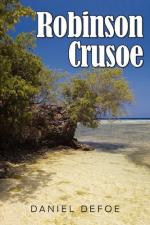|
This section contains 688 words (approx. 2 pages at 400 words per page) |

|
Narrative
Robinson Crusoe is a fictional autobiography written from a first-person point of view, apparently written by an old man looking back on his life. The story also includes material from an incomplete diary, which is integrated into the novel.
Spiritual Fable
Robinson Crusoe can be viewed as a spiritual or religious fable. Defoe was very concerned with religious issues, and nearly became a Dissenter minister. In the preface of the book, Crusoe asserts that he aims to "justify and honour the wisdom of Providence in all the variety of our circumstance."
In so doing, Crusoe clearly sees himself as part of the tradition of religious instruction manuals. The book does show similarities to the four different types of spiritual fable. Firstly, Crusoe, like many Puritans, keeps a diary in which he records his progress toward salvation. Of this first form of spiritual biography, the best known is John...
|
This section contains 688 words (approx. 2 pages at 400 words per page) |

|




